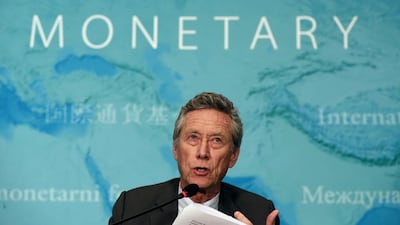The IMF has revised down its forecasts for economic growth in the Middle East this year, saying that lower oil prices and stagnating demand in the euro zone are likely to hurt the region.
The IMF predicts growth in the Middle East and North Africa of 3.3 per cent – 0.6 per cent lower than last year’s estimates. It cut its projections of growth next year to 3.6 per cent, a downwards revision of 0.5 per cent.
The IMF said that GCC states would not be hit as hard as other regional commodity exporters.
“[GCC] members are expected to use fiscal buffers to avoid steep government spending cuts in 2015. [But] the room for monetary or fiscal policy responses to shore up activity in many other exporters is limited,” the fund said.
The IMF recommended cuts to energy subsidies and boosting public capital expenditures to help Gulf states weather a period of low oil prices.
“In oil importers, the saving from the removal of general energy subsidies should be used toward more targeted transfers, to lower budget deficits where relevant, and to increase public infrastructure if conditions are right,” the fund said.
The IMF cut 2015 growth estimates for Saudi Arabia, the world’s largest oil producer, by 1.6 per cent – but the fund still projects growth of 2.8 per cent this year.
Oil has fallen to below US$50 per barrel, from highs of more than $100 per barrel last year, leading to major cuts in revenues in Gulf governments.
Oliver Blanchard, the chief economist at the IMF, and Rabah Arezki, the head of commodities, wrote that oil’s fall would hit some exporters worse than others.
“Oil exporters will want to smooth out the adjustment by not curtailing fiscal spending abruptly. For those without savings funds and strong fiscal rules, budgetary and exchange rate pressures may, however, be significant,” they wrote in a recent report.
“Without the right monetary policies, this could lead to higher inflation and further depreciation.”
The ratings agency Standard & Poor’s last year singled out Oman and Bahrain as especially vulnerable to oil price shocks, owing to their high fiscal break-even prices, lack of economic diversification, and small fiscal and hydrocarbons reserves.
Global growth projections were cut by 0.3 per cent for each of the next two years, with the Russian economy facing the largest downwards revisions.
The IMF’s projections indicate that Russia is currently in recession, its economy will shrink by 3 per cent this year, as sanctions, low oil prices and the dramatic fall of the rouble cut export income.
The fund previously predicted that Russia would grow by 0.5 per cent this year.
Euro zone forecasts also fell, with 2015 projections cut by 0.2 per cent and 2016 figures 0.3 per cent.
The euro zone appears to be on the brink of Japan style-deflation, after inflation fell below zero per cent in December, making it likely that the European Central Bank will introduce quantitative easing later this month.
“In the euro area, inflation has declined further, and adverse shocks – domestic or external – could lead to persistently lower inflation or price declines, as monetary policy remains slow to respond,” the fund said.
The IMF predicts that the euro zone will grow by 1.2 per cent this year, and 1.4 per cent next year.
abouyamourn@thenational.ae
Follow The National's Business section on Twitter

